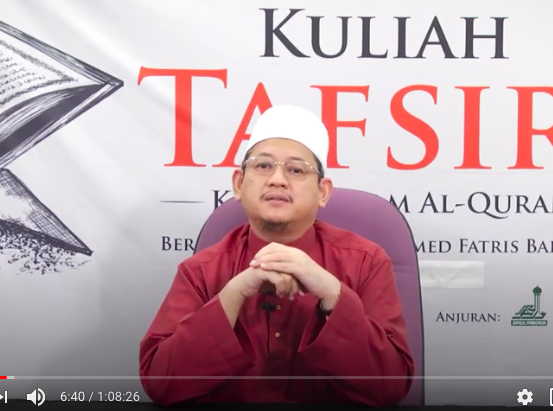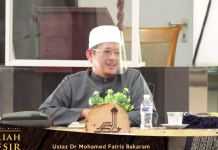This article is a summary of takeaways from Ustaz Dr Mohamed Fatris Bakaram’s Tafsir Lecture at Darul Makmur Mosque FB on 26th April 2020. Summaries of previous lectures on Surah Taha can be found here. This lecture is a continuation of last week’s lecture after Surah Taha verses 122 to 126.
Introduction to Surah Al-Anbiya’
The word “Al-Anbiya’” is translated to ‘The Prophets’. We can expect the stories of many of the prophets within this surah. Before I begin, I would like you to pay close attention to the first few verses of this surah. In the Qur’an, we can find some verses that are evidently narrating the stories of the prophets in a straight-forward manner. There are also verses that have a hidden or implied story. These are the verses which do not specifically mention any prophet or group of people but are sent down as a response to a certain incident or question that was posed. Although the verses seem to have a general meaning, they serve as specific responses to certain incidents and knowledge of the incidents is made available to those who examine and study the tafsir. The following verses fall under this category.
Surah Al-Anbiya’ is Meccan (Makki) surah. As previously explained, a Meccan surah is one that was revealed before the Hijrah. Just like the other Meccan surahs, Surah Al-Anbiya’ has the themes of: the Oneness of Allah, the prophethood of Muhammad SAW, stories of the Messengers of the past and the coming of the Day of Judgement.
The Day of Reckoning is Approaching
اقْتَرَبَ لِلنَّاسِ حِسَابُهُمْ وَهُمْ فِي غَفْلَةٍ مُّعْرِضُونَ
Ever closer to people draws their reckoning, while they turn away heedlessly. [21:1]
Allah SWT reminds us in this verse that judgement day is coming closer and closer. Human beings are described as ‘turning away’, meaning that they distance themselves from Allah SWT’s reminders to and deny the truth of the coming reckoning.
Let us have a closer look at the word “Iqtaraba”, coming from the root word “Qa-Ra-Ba”, meaning ‘near’. From this root, we get the word “Qarib” or in Malay, Karib, which is used to describe a close friend. “Qaruba”, derived from the same word, is a verb that brings the meaning of ‘It has come near’. The verb Iqtaraba, on the other hand, implies something that is ‘gradually coming closer and closer’. Instead of using Qaruba, Allah SWT chose the word Iqtaraba in this verse to tells us that the Day of Judgement has not yet come but is coming closer.
Regardless of when a person is born, the Day of Reckoning for each of us is coming closer. Whether or not we live to see the Day of Qiyamah, everyone has the same opportunity to prepare for it. Someone could die 50,000 years before the Day of Qiyamah and still only have so much time to prepare. The reason is that, even though the Day of Judgement may seem to be distant from his lifetime, his window of time for doing good deeds ends the moment his life ends. All of us experience our own “small Qiyamah” on the day of our deaths – on that day, our opportunity to do deeds that prepare us for our reckoning has terminated. The time period between our deaths and the Day of Judgement is no longer of any use to us.
People are in Heedlessness
From this verse, we learn that even the people who are aware of the coming of the Day of Judgement are turned away from it. They believe in it, but their actions and deeds do not reflect their belief. They do not occupy themselves with preparing for the reckoning. Instead they delude themselves into thinking that there is still time to prepare. This is the state of human beings. Some people are in a worse state, they completely deny the truth of the Day of Judgement, thinking that everything ends the moment they die.
We are told that not only are people turned away, they are lost in heedlessness. The phrase used is “fi ghaflatin”, which can be translated to ‘in negligence’. Notice that Allah SWT did not just say that these people are negligent, He SWT says that they are in negligence. There is a difference between someone who is wet and someone who is immersed in water. This is the state of human beings, they are immersed in negligence. It is not easy to remove someone from a state of heedlessness. One reminder may not suffice, repeated attempts will be required.
People Reject Revelation
مَا يَأْتِيهِم مِّن ذِكْرٍ مِّن رَّبِّهِم مُّحْدَثٍ إِلَّا اسْتَمَعُوهُ وَهُمْ يَلْعَبُونَ
Whenever any fresh revelation comes to them from their Lord, they listen to it playfully [21:2]
Reminders from Allah SWT does reach these people – they are not deaf. However, not only do they not take the reminders seriously, they make fun of it. These people choose to remain heedless. They do not make it a point to pay attention and take heed whenever a reminder is received.
My dear brothers and sisters, as has been previously mentioned, as we go through these stories of the prophets and people of the past each week, we need to realise that the purpose is not to look at them as separate or irrelevant from ourselves. We should not be thinking to ourselves, “Wow, it’s no wonder they got punished!” or “These people should have known better!”. Instead, we should use this as an opportunity for introspection. Say to yourself, “Allah SWT has punished these people because of how they acted. Do I have any similar attitudes or habits as them within myself?”.
These stories were placed in the Qur’an as reminders for us. Take heed and ensure that whatever reminders given to you are put into constructive action. Do not wait for a day when your Book of Deeds are revealed to you, and only then do you realise that all of your life, you had been acting in a way similar to the ignorant people of the past. Have a look at your own character, attitudes and actions right now; Act while you still can.
The Adab of Responding to Revelation
Additionally, this verse reminds us of the proper adab of accepting and listening to the Qur’an. As believers, whenever we interact with the Qur’an, we need to come with respect, having hearts full of Khushu’ (having humility and being fully present) and paying attention to whatever that Allah SWT has to say to us. We are forbidden from being in a state of fooling around, taking things lightly and joking to one another when the Qur’an is being recited.
In surah Al-A’raf, verse 7 we are told:
وَإِذَا قُرِئَ الْقُرْآنُ فَاسْتَمِعُوا لَهُ وَأَنصِتُوا لَعَلَّكُمْ تُرْحَمُونَ
So when the Qur’an is recited, then listen to it and pay attention that you may receive mercy. [7:204]
We are not asked to just ‘hear’, but to ‘listen’. Anyone who is not paying attention may just hear something in passing. However listening requires something more – you need to put in effort to be attentive and present in order to listen. As believers, we should give the Words of Allah SWT their proper rights, in hopes that Allah SWT may open the doors of our hearts and fill them up with His Love and Mercy.
Hurtful Words Whispered in Secret
لَاهِيَةً قُلُوبُهُمْ ۗ وَأَسَرُّوا النَّجْوَى الَّذِينَ ظَلَمُوا هَلْ هَٰذَا إِلَّا بَشَرٌ مِّثْلُكُمْ ۖ أَفَتَأْتُونَ السِّحْرَ وَأَنتُمْ تُبْصِرُونَ
their hearts paying no heed. And the wrongdoers whisper in secret, “Is this (man) anything but a mortal like yourselves? Are you going to fall under his spell with your eyes wide open?” [21:3]
Their heedlessness is further emphasised in this verse when Allah SWT mentions that these people pay absolutely no attention whatsoever to Prophet Muhammad SAW’s message.
The phrase “asarru an-najwa” translates to ‘they hide their whispers secretly’. This verse refers to the disbelievers of Quraysh. These are the people who reject and mock anything that has been revealed by Prophet Muhammad SAW. At times, they will be open in their disapproval of the prophet – criticising, threatening and tormenting him publicly. At other times, they would curse and make fun of him, but in whispers, so as to not be heard by the prophet himself. Some of you may be wondering why the Quraysh would choose to whisper amongst themselves when their public disapproval might hurt the Prophet SAW more.
My dear brothers and sisters, have a look at your own social circles. We know of people who are open in their disapproval of us. These are the people who will be straightforward and make it clear to us when they do not like us. They intend for their words to evoke a reaction from us – be it anger, embarrassment or pain.
However, there is another group of people who choose to hurt us by whispering to others about us. These people think that for as long as we are not aware of what is being said about us, we will get hurt and upset just knowing that we are being spoken of. This is the group being mentioned in the above verse.
The Prophet’s “Spell”
The Quraysh whispered amongst themselves criticising the Prophet SAW. They asked each other why they should believe a mere mortal like themselves. They claimed that an angel bearing the message would be more believable than just another human being.
However, despite their stubborn rejection and firm disbelief, the Quraysh were unable to deny that the revelation that Muhammad SAW brought had an impact on them. These verses were more beautiful than whatever they were used to hearing. Even Abu Jahl was narrated to have sneaked around Prophet Muhammad SAW’s residence in the darkness of the night, just so he could listen to him SAW reciting the Qur’an in his prayer. He was not alone in this act, several other disbelievers too did the same thing.
It came to a point where they would encounter one another in their nightly visits to the Prophet’s house. They would warn one another to stop coming back and yet found themselves drawn to the recitation of these verses again and again. Even though their desires kept them firm in their rejection of the message, their hearts and souls were naturally attracted to the beauty of the verses. They could not resist the temptation to come for more of Allah SWT’s revelation.
Now, being in the situation they were in, someone with an open mind and heart would ask themselves why they had been so drawn to the verses. They could have told themselves, “There is something different about these verses. Perhaps I should pay attention and have a look if there is anything I can get out of them.”. Moreover, the Quraysh had noticed that not only were the verses gentle and soothing to the ears, they had a clear impact on the heart.
However, the Quraysh were stubborn in their choice to reject the truth and remain in disbelief. They looked for ways to defend their rejection of the message. They twisted their words, attributing their being mesmerised by the recitation of the Qur’an to sorcery. They accused Prophet Muhammad SAW of putting a spell on them, warning one another to stay clear of him because he SAW was clearly just another human being like themselves.
Allah Hears and Knows All Things
قَالَ رَبِّي يَعْلَمُ الْقَوْلَ فِي السَّمَاءِ وَالْأَرْضِ ۖ وَهُوَ السَّمِيعُ الْعَلِيمُ
He (Prophet Muhammad SAW) said, “My Lord knows everything that is said in the heavens and the earth: He is the All-Hearing, the All-Knowing.” [21:4]
Prophet Muhammad SAW made known to the Quraysh that nothing that they say, whether whispered in secret or declared to the public, is unknown to Allah SWT. In fact, even that which is concealed in their hearts and not spoken aloud is heard by As-Sami’.
Furthermore, Allah SWT is Al-‘Aleem. At times, we as human beings may hear what others are saying but we do not understand. Al-‘Aleem is above that, He Knows and Understands all things. I would like to end with two stories to demonstrate this verse.
The Story of Abbas RA
The first is of Al-Abbas bin Abdul Muttalib, the uncle of the Prophet SAW. In the early days of Muhammad’s prophethood, Abbas fought as a disbeliever, opposing the Prophet SAW’s army during the Battle of Badr. During this battle, Quraysh’s army was defeated by a small Muslim army of a third of their size. Those who survived returned home to Mecca with heads bowed out of embarrassment. A portion of them, including Abbas, were brought to Medina as prisoners of war.
After some time, Prophet Muhammad SAW ordered for them to be released, under the condition that they paid a fee (fidyah) for their freedom. When it came the time for Abbas RA to pay, he told the prophet that the wealth and weapons he had lost during the war (taken by the believers as spoils of war) should have already sufficed as his payment. The Prophet SAW disagreed, insisting that the freedom fee had to be paid independently from the spoils of war. Abbas claimed that he no longer had any money left.
Prophet Muhammad SAW then asked Abbas about the money he had set aside with his wife, Ummu Al-Fadhl. Before leaving for the war, Abbas had secretly instructed his wife to keep the money safe and distribute it amongst his children should Abbas fail to return from the war. At that moment, Abbas RA acknowledged the prophethood of Muhammad SAW. He knew that there was no way for the prophet to have known about that agreement, if not for Allah SWT’s revelation.
The Story of Hatib RA’s Letter
This incident happened in the 8th year of Hijrah, before the opening of Mecca (Fathul Makkah). When Hatib ibn Abi Balta’ah RA, a companion of the Prophet SAW, heard about the Prophet SAW’s plan to enter Mecca, his heart felt uneasy. His small family, including his wife and children were in Mecca at that point of time and he had no other relatives there. He feared for their safety.
Hatib wrote a short letter to inform the Quraysh that Prophet Muhammad SAW and his troop was coming to invade Mecca. He asked, in exchange for this warning, that his family be kept protected during the said invasion. He hired a woman to act as his messenger. She folded the letter neatly and hid it in her hair as she headed off for Mecca.
The news of this letter reached the Prophet SAW, who sent Sayidina Ali RA after the woman went to remove the letter from her. No matter what happened, the news of the invasion was not to reach the Meccans, otherwise their plans would be spoiled as the Meccans prepared for their arrival. When Sayidina Ali caught up with the woman, they searched her belongings trying to find the letter but to no avail. Sayidina Ali faced the woman and firmly said, “I have no doubt that the Messenger of Allah SAW has never lied. It is impossible for him to be lying right now. He has informed me of a letter that is with you, surrender it now or I will search you until I find it.”
There was a narration that said that the woman asked him if he, as a believing man, would do such a thing as to threaten her dignity and search her clothes just to find a letter. However, she saw his firmness in his demand and surrendered the letter to him.
This letter was relayed to the Prophet SAW who questioned Hatib about it. Hatib RA explained that he believed in Allah and the Prophet and had no intention of any harm to the believers. His only concern was for the safety of his wife and children. At that moment, Sayidina Umar Al-Khattab RA asked the Prophet SAW for his permission to behead Hatib as a punishment for his act of treason. He was enraged with Hatib, whose thoughtless deed could have completely sabotaged the Prophet SAW’s plans and led to great losses for the Muslims.
The Prophet SAW calmly stopped Umar RA, reminding him that Hatib RA was amongst the believers who fought in the Battle of Badr. Allah SWT had raised the status of the warriors of Badr above other believers. Perhaps at that moment, the Prophet SAW was made aware of Allah SWT’s forgiveness of Hatib RA. Hatib’s mistake was done not out of treason, but merely out of his concern and love for his family. Hatib’s heart was filled with faith and love for Allah SWT and he had been unaware of the potential impact of his actions.
Final Thoughts: Leave the Haters to Allah
These incidents highlight Allah SWT’s knowledge of all things – even the things that would otherwise have been impossible to be known by any human being on Earth. We see that throughout prophetic history, Prophet Muhammad SAW had always been protected by Allah SWT from all forms of evil by the enemies of the prophet.
Let this be a reminder for us to stay firm in our belief that Allah SWT knows and hears all things. Do not ever let the words and actions of people affect us. Whatever that is spoken about us whether in the open or in secret, let that be known by Allah SWT and leave it at that. Know that even the harm that is being done unto you without your knowledge is known by Allah SWT. Allah SWT is Most Just, and He is the Best of all Protectors.
Do not concern yourself with others’ hatred towards you to the extent that you lose sleep at night thinking about what they are doing to you. Realise that a person who bears hatred in his heart is unable to find peace because of his hatred. Do not follow their footsteps and let yourselves fall victim to being affected by their actions. Do not let their actions interfere with your work, your worship or your life. Leave them to Allah SWT. You belong to the Ummah of Prophet Muhammad SAW, so emulate him.
This month of Ramadhan is the time for us to have a look at our internal states. This is the month where we cleanse our hearts and train ourselves to keep our secrets with Allah SWT, just as how whether or not we are truly fasting is only known by Allah SWT. This is the time when we train ourselves to rely only on Allah SWT, to be firm in our Tawakkal and to trust Him whole-heartedly.
May we all leave Ramadhan as people with firm hearts. May we become the people of Tawakkal and Sabr, such that come what may, regardless of what people say or do towards us, we will stay firm with our trust in Allah SWT.
Ameen.
Summary by: Arina Adom
Arina Adom is a lover of learning who takes on the world with an open mind. Resourceful and adaptable, always ready to take on new challenges. Comfortable working with diverse groups of people, yet able to work independently. Thrives under pressure. Currently seeking a meaningful career that enables her to impact lives directly and bring about positive changes in the lives of others in the community.
Arina graduated with a degree in Science ( Hons ), Life Science from NUS. She is currently taking a diploma in Quran and Sunnah Studies from Al Zuhri.
Watch Kuliah Tafsir again at
Masjid Darul Makmur’s Youtube
Watch and follow Kuliah Tafsir weekly
every Sunday after solat Maghrib
organised by Masjid Darul Makmur
Your contributions are appreciated. Get more details by clicking the image below.











